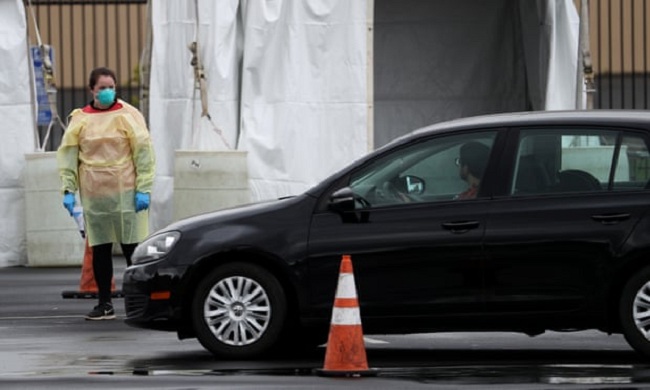Google’s Coronavirus Testing Sites Watch Little Activity Despite Trump’s Hype
A Google-affiliated program to allow people to schedule coronavirus tests online has been hyped by Donald Trump and become the focus of scrutiny by Democratic senators, who asked Google in a letter on Wednesday to address serious privacy and data collection concerns.
But at two of the pilot testing sites in California on Tuesday afternoon, not much was happening at all.
At one drive-in testing site in a driveway on a commercial strip in San Jose, staffers started dismantling the operation at 2.15 pm. Within minutes, the signboards advertising “Test Center” was gone, the tent was down, and testing appeared to be done for the day.
Another testing site in San Mateo was still open later in the afternoon, but over half an hour, just a single car drove into the parking lot where the screenings were being done.
In the face of growing criticism that his administration had been responsible for deadly delays in coronavirus testing, Donald Trump announced on Friday that Google was launching a website to help Americans determine whether they were eligible for a test and where they could schedule one. The site would be “very quickly done”, Trump promised.
Google executives scrambled to reconcile the president’s pledge of a national screening website with what had actually been in development: a small Bay Area pilot site made by Verily, a healthcare data subsidiary of Alphabet, Google’s parent company. The triage website had been originally intended only for healthcare workers, a company spokeswoman told the Verge. Instead, once in the national spotlight, Verily launched the site for the general public in two Bay Area counties on Sunday evening. By Monday morning, site users were told that the available testing spots had already been filled.
Two of Verily’s three Bay Area testing sites, in Santa Clara and San Mateo counties, were both very modest. In San Jose, two workers dressed in face masks and protective robes waited in a driveway, not far from the public bus station at the corner, where a young man was waiting for the bus. As a car slowed down by the driveway entrance on Tuesday afternoon, the workers moved forward, ready to spring into action, but the car rolled on.
In San Mateo, the testing site was in a large parking lot in a residential neighborhood, and three private security guards in face masks monitored the entrance. Multiple signs across the lot warned: “Windows Up – Stay in Car”. When one car pulled into the lot late in the afternoon, workers in protective gear approached and appeared to consult with the driver. Then the car drove in further, towards some tents that had been set up at the back of the lot. Meanwhile, local residents continued to stroll by the entrance on their afternoon walks, which were still permitted under the emergency “shelter in place” order that had gone into effect across much of the Bay Area on Tuesday.
Earlier on Tuesday, Bloomberg News had reported a much more modest projection: a source had said that the company had completed “approximately 20” tests on Monday and was hoping to roughly double that number on Tuesday.
A Verily spokeswoman declined to comment on why a Santa Clara testing site appeared to be closing shortly after 2 pm, or whether the company had reached its projected target of 320 tests.
Mobile testing sites, at which potentially infected people can get a quick, drive-through test for the coronavirus without leaving their cars, are not a Google innovation. Kaiser Permanente hospitals, among other healthcare providers, have been offering drive-up coronavirus testings at locations across the Bay Area. Overall, Kaiser, a major healthcare consortium which has most of his membership in California, has been screening hundreds of people a day for coronavirus in some recent days, a spokesman said. Appointments for Kaiser’s drive-up screening are scheduled in an old-fashioned way: through an order from one of the healthcare group’s doctors.
Verily’s Pilot program was supposed to offer something more innovative: a website where anyone can complete a quick screening, and then, if eligible, schedule an in-person test at a mobile location.
The website has already prompted major privacy concerns, even as its site reached capacity for scheduling new tests only hours after its launch.
Five Democratic senators, including California’s Kamala Harris, wrote in a letter to the Alphabet CEO, Sundar Pichai, on Wednesday that they were concerned that neither the company nor the Trump administration had “assessed what privacy and cybersecurity vulnerabilities may arise” in launching a public coronavirus screening website and requesting detailed information on how the company would use, share, and project the personal data submitted through the screening website.
The pilot screening tool, from Verily’s Project Baseline, required users to login with a Google account, or to create one.
“All the data provided by Baseline users for screening is stored separately and not linked to any of Google’s products and services,” a Verily spokeswoman said in a statement on Wednesday. “Data will not be used for advertising purposes.”




